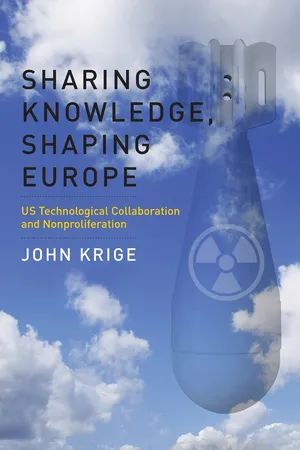
Sharing Knowledge, Shaping Europe
US Technological Collaboration and Nonproliferation
- English
- ePUB (mobile friendly)
- Available on iOS & Android
Sharing Knowledge, Shaping Europe
US Technological Collaboration and Nonproliferation
About this book
In the 1950s and the 1960s, U.S. administrations were determined to prevent Western European countries from developing independent national nuclear weapons programs. To do so, the United States attempted to use its technological pre-eminence as a tool of "soft power" to steer Western European technological choices toward the peaceful uses of the atom and of space, encouraging options that fostered collaboration, promoted nonproliferation, and defused challenges to U.S. technological superiority. In Sharing Knowledge, Shaping Europe, John Krige describes these efforts and the varying degrees of success they achieved.
Krige explains that the pursuit of scientific and technological leadership, galvanized by America's Cold War competition with the Soviet Union, was also used for techno-political collaboration with major allies. He examines a series of multinational arrangements involving shared technological platforms and aimed at curbing nuclear proliferation, and he describes the roles of the Department of State, the Atomic Energy Commission, and NASA. To their dismay, these agencies discovered that the use of technology as an instrument of soft power was seriously circumscribed, by internal divisions within successive administrations and by external opposition from European countries. It was successful, Krige argues, only when technological leadership was embedded in a web of supportive "harder" power structures.
Frequently asked questions
- Essential is ideal for learners and professionals who enjoy exploring a wide range of subjects. Access the Essential Library with 800,000+ trusted titles and best-sellers across business, personal growth, and the humanities. Includes unlimited reading time and Standard Read Aloud voice.
- Complete: Perfect for advanced learners and researchers needing full, unrestricted access. Unlock 1.4M+ books across hundreds of subjects, including academic and specialized titles. The Complete Plan also includes advanced features like Premium Read Aloud and Research Assistant.
Please note we cannot support devices running on iOS 13 and Android 7 or earlier. Learn more about using the app.
Information
Table of contents
- Series Page
- Title Page
- Copyright Page
- Table of Contents
- Acknowledgements
- Primary Sources
- Introduction
- Chapter 1: The United States and the Promotion of Euratom, 1955–56: Integration as an Instrument of Nuclear Non-Proliferation
- Chapter 2: The United States and Euratom, 1957–58: Constructing a Joint Program for Nuclear Power
- Chapter 3: “A Substantial Sop,” or “Positive Disarmament”? Johnson, Erhard, and Bilateral Space Collaboration
- Chapter 4: Integration and the Non-Proliferation of Ballistic Missiles: The United States, the United Kingdom, and ELDO, 1966
- Chapter 5: Classification, Collaboration, and Competition: US-UK Relationships in Gas-Centrifuge Uranium Enrichment in the 1960s
- Conclusion
- Notes
- Bibliography
- Index